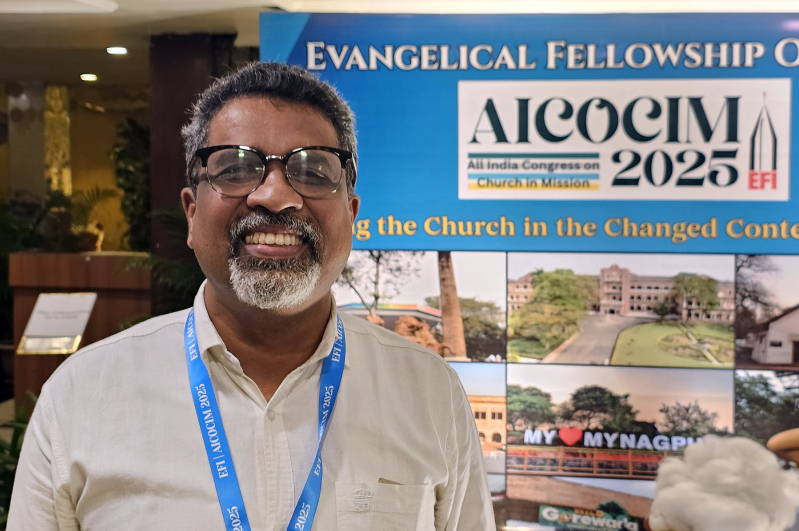
On the sidelines of the All India Congress on Church in Mission (AICOCIM), Dr. P.C. Mathew, founder of Urban India Ministries and global family challenge director for the World Evangelical Alliance, warned that the health of the Indian Church hinges on how it responds to crises within the family.
In an in-depth conversation with Christian Daily International, Mathew said the Church can no longer ignore issues inside homes while focusing outwardly on evangelism and programs. He argued that discipleship must begin in households and be modeled by pastors and leaders if the next generation is to remain rooted in faith.
“God gave us the burden to preach and teach about family”
Mathew described his own unexpected journey into family ministry. Trained as a pastor, he initially wanted to serve as a missionary in remote parts of India. But the repeated breakdowns he saw among his friends’ marriages and family lives in the 1990s led him to a different path.
“Many of my peers were strong in their faith during their youth but later went through deep crisis in their homes,” he said. “It affected their spiritual life and church life, and they isolated themselves from everything else. That is when God gave us the burden to preach and teach about family.”
In 1998 he founded Urban India Ministries, which has since grown into a platform for teaching, counseling, and equipping families across the country. He said Scripture confirmed that family is central to God’s design for building his kingdom.
Breaking the silence of the Church on family struggles
Mathew, who serves in ministry together with his wife Ciby, argued that the crisis in families has often been magnified by the silence of churches. Many congregations, especially first-generation Christian communities, lack any precedent for Christian family life. Believers who come from non-Christian backgrounds often carry old cultural patterns into their marriages without guidance or discipleship.
“In most churches, discipleship is measured by prayer, Bible reading, or sharing the gospel,” he said. “But little attention is given to whether someone is a good husband, wife, or parent. As a result, all the crises present in the world are also present in the church.”
Even in traditional churches with multiple generations of Christians, Mathew said, family problems are usually treated as private and shameful, never spoken of openly or addressed in teaching. That leaves pastors and even their own families struggling in isolation.

Creating space for honest conversations at home and in church
The first step, Mathew insisted, is for churches to acknowledge the problem and create space to speak about family discipleship. He recalled how, early in his pastoral ministry, a 10-week sermon series on family dynamics opened floodgates of conversation.
“People were opening up and looking forward to the next message,” he said. “There was conversation at home about what was preached. That showed me the power of addressing these issues from the pulpit.”
He urged pastors and leaders to make family discipleship part of their core ministry, not an afterthought. “If leaders and pastors take this as their mission, people will feel comfortable talking about their struggles,” he said. “That is the first step to healing.”
“If leaders’ families are not examples, how will others be inspired?”
Mathew said the absence of role models is one of the greatest obstacles facing young people in the Church. Too many pastoral families themselves are beset with problems, leaving the next generation unconvinced that Christian faith makes a difference in everyday relationships.
“Younger generations are not attracted by the church any longer because they do not see healthy role models,” he said. “If leaders’ families themselves are not examples, how will others be inspired?”
He called on pastors and leaders to embody the values they preach — practicing mutual respect, humility, and love in their own homes. “Teaching requires us to practice what we say,” he said. “When families of leaders are role models, others will follow.”
Intergenerational discipleship: mission that begins in the home
At AICOCIM, Mathew participated in the track on family and children, with a focus on intergenerational discipleship. He emphasized that families must be the starting point of discipleship, passing faith intentionally from parents to children.
“We cannot be satisfied with discipleship that happens only in the church building,” he said. “Mission must start within the home. That is where character is shaped, where values are lived out, and where the next generation learns faith by seeing it practiced.”
The neglect of homes, he warned, has already borne fruit in weakened churches and drifting youth. But he expressed hope that if churches recover the vision of missional families, the trend can be reversed.
India’s cultural strengths and challenges
Mathew contrasted the situation in India with other parts of the world. He noted that Indian culture traditionally values strong family bonds, with children often living at home until marriage and sometimes beyond.
“Because of this, the crisis is surprising for us,” he said. “Even with family bonding, we still see breakdowns. So we must interpret biblical principles like ‘leave and cleave’ in ways that fit our context. The challenges are different here than in Western countries.”
At the same time, he observed that family crises are a global phenomenon. “Everywhere I travel, I see families in crisis,” he said. “But I also see God awakening the Church in a way I did not see 20 years ago.”
“When families are strengthened, the whole church is strengthened”
Looking ahead, Mathew said he believes addressing family discipleship will secure the future of the Indian Church. If churches create spaces for honesty, model healthy family life, and equip parents to disciple their children, the next generation will grow up with resilience and faith.
“If the church addresses this well, there is hope for the next generation,” he said. “We will send a strong message that families cannot be taken lightly. This will strengthen the church, increase faith, and help children stay connected to the community of believers.”
Mathew pointed to his book on missional family as a framework for the future. His vision is for every home to become a missional family, where the witness of the gospel begins not in programs or crusades but in the ordinary life of marriage, parenting, and hospitality.
Families at the heart of mission: “Every home must become a missional family”
A recurring theme in Mathew’s reflections is the need to bring family issues out of the private sphere into the life of the church. Silence, he warned, perpetuates shame and keeps problems hidden until they fracture relationships.
By normalizing conversations about marriage, parenting, and household discipleship, churches can equip believers to navigate cultural pressures and spiritual challenges. “When families are strengthened, the whole church is strengthened,” he said.
For Mathew, the message coming from the family track of AICOCIM is clear: mission begins at home. Evangelism and outreach are vital, but without strong families, the Church’s witness will falter.
“Every home must become a missional family,” he said. “That is how the Church in India will grow stronger, inside and outside.”





